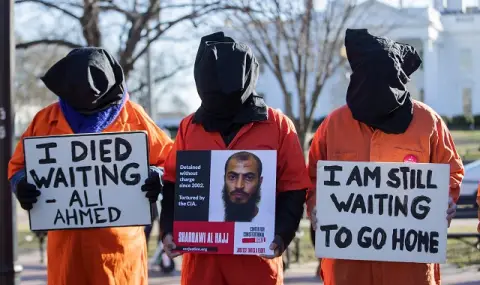The intensified courtship of the Taliban in Afghanistan very clearly shows that the Putin regime in Russia is ready to accept even the most vile regimes as partners - as long as they are ready to be friends with it. By Konstantin Eggert.
As expected, the Supreme Court of Russia granted the request of the Russian Prosecutor General's Office to lift the ban on the radical Islamist movement “Taliban“ on the territory of the country. Such proposals were sent to President Putin about a year ago by two ministries – of Justice and Foreign Affairs.
Last summer it became clear that the issue was moving towards a positive outcome and the Taliban would be removed from the list of terrorist organizations: At the summit of the Shanghai Cooperation Organization, Putin told journalists how actively the Taliban were cooperating with Russia in the fight against the so-called “Islamic State“ (IS). Then in December, Putin signed a law that allows the Taliban, who are once again ruling Afghanistan, to be removed from the list of terrorist organizations.
The Kremlin has long maintained semi-official contacts with the Taliban, so the decision of the court in Moscow is just a formality. But one that illustrates the current thinking of the Putin regime.
Why did the Kremlin change its attitude towards the Taliban?
The Kremlin added the Taliban to the list of terrorist organizations in 2003. Then, after the events of September 11, 2001, Russia morally supported the West in the fight against Islamic terrorism. At that time, Putin talked a lot about common interests with the United States in this area. In general, the Kremlin supported the overthrow of the Taliban regime by the Americans and the presence of an international contingent in Afghanistan under the auspices of NATO. Russian television talk shows often gloated that the West was experiencing the same problems that the Soviet Union once had in Afghanistan, but in general, the Western presence there was seen as beneficial to Russian interests.
In 2002 At the NATO summit near Rome, the NATO-Russia Council was established, which, among other things, was supposed to coordinate the interaction between Moscow and Western allies in the field of global security.
US weakness also untied Putin's hands
In Putin's eyes, the hasty, poorly planned and ill-considered withdrawal of the US from Afghanistan in the summer of 2021 was one of the confirmations of America's weakened global influence and capabilities. I am inclined to agree with those analysts who believe that it was this weakness of Washington that made it easier for the Russian dictator to make the final decision to launch a full-scale invasion of Ukraine. In the eyes of the Kremlin, the Taliban have defeated America, they are the “strong guys” who should be respected for this.
Most countries in the world do not recognize the Taliban as a legitimate authority. Moscow is formally among them, but in reality it is doing exactly that. There is a Russian embassy in Kabul, and Moscow accredits Afghan diplomats to serve in Russia. Kremlin representatives meet regularly with Taliban emissaries and discuss potential cooperation. Recently, the regime in Kabul has been insisting that Russia repair Soviet-built roads and tunnels. If Putin responds positively, this will be another step towards the de facto normalization of relations that has been going on for a year.
What does Putin want with the Taliban?
After the ignominious collapse of Bashar al-Assad's regime in Syria, it is especially important for Putin to maintain his image as a strong player in the Near and Middle East. The Kremlin's only regional ally at the moment remains Shiite Iran. And Tehran's relations with the radical Sunni Taliban are very tense. Thus, Putin's influence in Kabul could be one of his levers for influencing the Iranians. But in order not to annoy its Iranian "friends", the Kremlin is unlikely to soon proceed with official diplomatic recognition of a Taliban "emirate".
Moscow is not at all concerned about public life in Afghanistan, drug trafficking or women's rights there. Moreover, this is completely in line with trends in Russia - the orientation towards a "strong-arm regime" and the "traditional values" that have meanwhile become a caricature.
What are the rules in Afghanistan
Last year, Putin himself praised the Taliban, who, in his words, were trying to ensure that "everything in Afghanistan is stable and calm and obeys certain rules". And the fact that these rules provide for public executions and floggings, and the deprivation of women's civil rights, is clearly of no importance to the Kremlin. The deliberately vague reference to "a certain order" is a classic illustration of the hidden colonial contempt for "savages".
Representatives of the Russian ruling elite, who consider themselves "true Europeans", call "savages" not only Afghans, but also most of the inhabitants of the countries of the "global South" - the same ones whose favor they are simultaneously actively seeking against the backdrop of their aggression against Ukraine and confrontation with the West.
Intensified cooperation with the Taliban is one of the opportunities to demonstrate that Putin's Russia is ready to accept even the most vile regimes from the “global South“ as partners - as long as they are ready to be friends with it.
This comment expresses the personal opinion of the author and may not coincide with the positions of the Bulgarian editorial office and DW as a whole.
